Anthropology Program
Mailing Address
Cleveland State University
World Languages, Literatures, and Cultures; Anthropology Program
2121 Euclid Ave.
Cleveland, Ohio 44115
Campus Location
Rhodes Tower (RT)
1860 E. 22nd Street
World Languages, Literatures, and Cultures, Room 1619
Contact Us
Phone: 216.687.4646
What can you do with a major in Anthropology?
WHAT CAN YOU DO WITH A MAJOR IN ANTHROPOLOGY???
by Jill McGrath Jones, M.A., Former CSU Anthro Major
I have had the profound good fortune to work in the field of humanitarian aid from post-conflict Bosnia and Croatia to more recent natural tragedies in Indonesia and Pakistan. The training I received at Cleveland State was critical to developing my understanding of health, culture, and theory. I especially thank Drs. Barbara Hoffman and Robert Mensforth for mentorship and for exceptional educational and professional support. With the solid foundation in anthropology I received at CSU, I was able to successfully go on for the M.A. in medical anthropology as well as a Graduate Certificate in Public Health. I urge you to consider this program and its implications. My work focuses on the health and education needs of women and children in emergency settings - an opportunity I am proud to be a part of and for which I am so grateful. Colleagues of mine (anthropologists) are conducting vital research in health care, traditional medicines, and HIV/AIDS; aiding criminal investigations with forensic identification; responding to nutritional needs and designing programs that address and slow trends in US obesity and diabetes; teaching the next generation of anthropologists. And these just name a few.
There is a challenge inherent in giving aid, particularly in the wake of a disaster, more so in the wake of war. That challenge lies beyond the difficult logistics, harsh conditions, and the shock and sadness of mass destruction. It has to do, instead, with the ability to listen and to bend. The role of the anthropologist in emergency and refugee settings seems intuitive - providing culturally accurate input that enhances the delivery of appropriate aid.
Some go further to state that the anthropologist has an obligation to act as a witness to human rights violations, to provide understanding and voice to a plaintiff's condition and perception of his/her rights. It is left to each individual to formulate that understanding and role for themselves.
Basically the role of the anthropologist in the context of emergency and relief is to point out glaring errors and obvious facts and to ease the misconceptions of both sides of the population (aid workers and refugees). We bring a unique perspective, and more and more aid agencies, donors, and NGOs are employing anthropologists in their cadre of first responders, as well as in the recovery and development teams.
But surely, anthropologists are not the only aid workers in the field with cultural competency. Emergency and post-conflict interventions are well-intentioned and provide much-needed respite and supplies; and those who put themselves in these settings are honorable humanitarians. Yet there is often a cultural and social ignorance in the design and planning of programs for non-Western people and areas, and their appropriateness is as varied as the settings to which they are applied. Development schemes may leave vulnerable groups impoverished or unrepresented; social inequities may be unintentionally imposed, especially in camps, contributing to poor health for those already disenfranchised, most often women and children; "cookie-cutter" program designs that do not evolve with the affected population's needs and sensibilities can exacerbate need rather than eliminate it.
The anthropologist's toolkit has a significant effect on the design and the implementation of aid intervention. Our skills in ethnography, in observation, and in participation, all lead to a deeper understanding of a community's needs, and forge a bridge between aid that is delivered and imposed to aid that is participatory and sustainable. Our theoretical background allows us to inform based on understood issues of pollution, contamination, power, micropolitics, gender, kinship, and hegemony, to name a few. In short, the anthropologist fills a role and an obligation to speak with people, to ask the correct questions, to frame answers in workable solutions - and a duty to both develop an analytical understanding of the setting and to convey this understanding to other professionals.
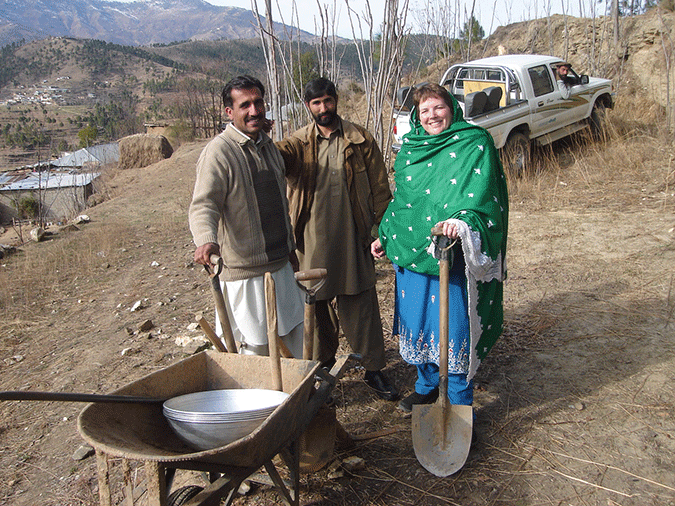
Jill and friends making preparations for road and mosque repair in Shah Kot, Oghi, NWFP Pakistan
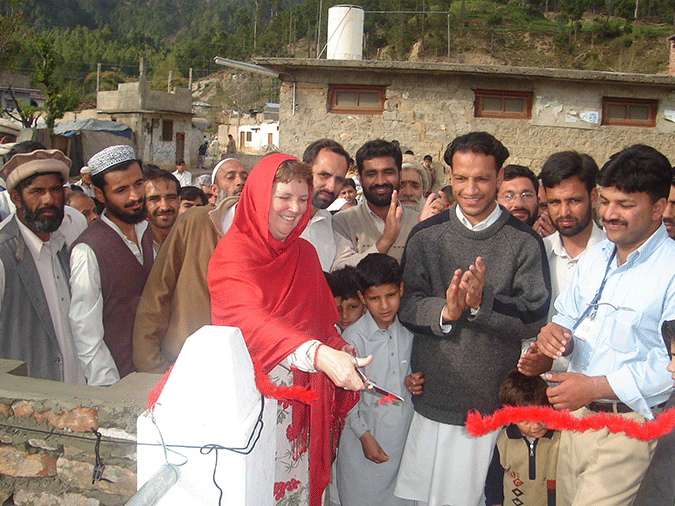
Ribbon-cutting ceremony for the repaired bridge in Kotli Payeen, Ichrian, NWFP. This bridge allowed safe access to the new schools also supplied by this project in this severely damaged community.
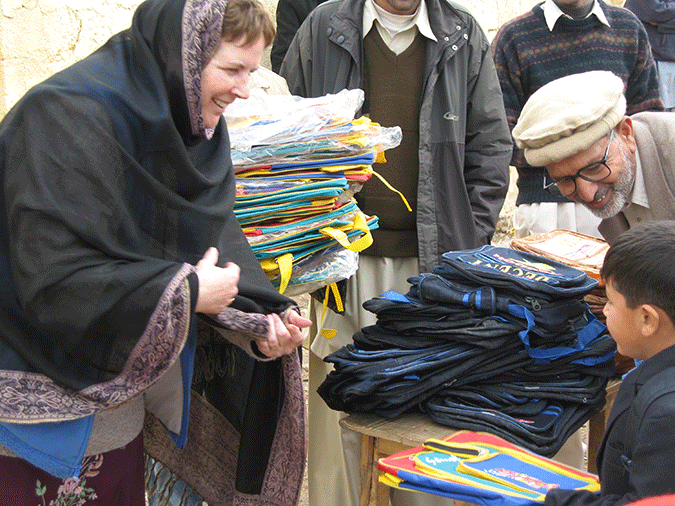
New school bags, books, and other educational and psychosocial supplies distributed to students at an emergency school site in Trawra, Oghi, NWFP
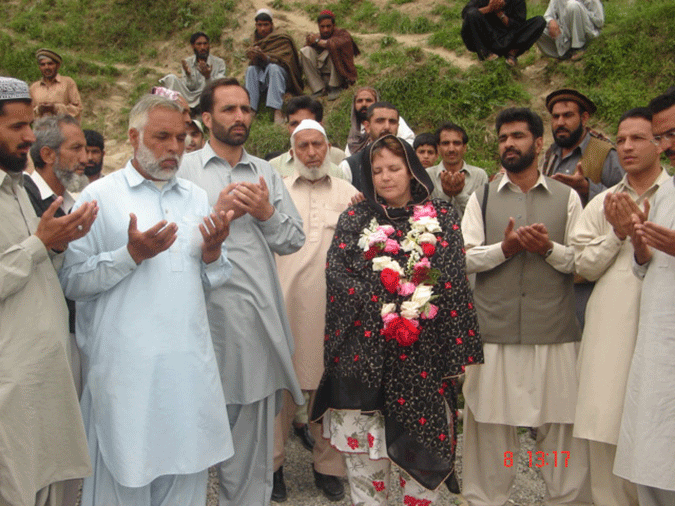
A gift of roses for Jill and an offering of prayer at the opening of a newly repaired bridge in Kund Tarla, Ichrian, NWFP. This bridge will provide access to supported schools and improves safety and egress for over 2000 people in this and surrounding communities.
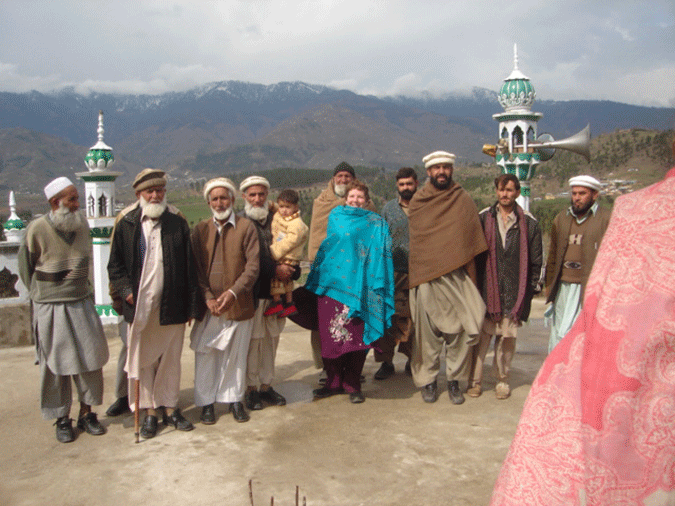
Jill with a newly formed Community Committee who oversaw the repair of this mosque in Shah Kot, Oghi, NWFP. All projects start with the development of a committee who represent the community and take responsibility for each step of the process.
Mailing Address
Cleveland State University
World Languages, Literatures, and Cultures; Anthropology Program
2121 Euclid Ave.
Cleveland, Ohio 44115
Campus Location
Rhodes Tower (RT)
1860 E. 22nd Street
World Languages, Literatures, and Cultures, Room 1619
Contact Us
Phone: 216.687.4646